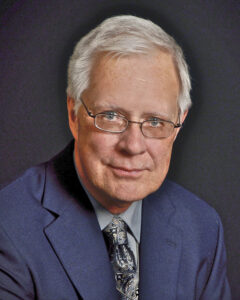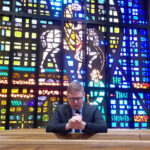By Greg Cusack
For The Catholic Messenger
In a recent column (Catholic Messenger,11-19-15), you described two cartoons depicting reactions to the recent Paris massacres, in which one of them showed a muscular, armed Statue of Liberty wading across the Atlantic in order to assist France combat the terrorist threat.

That image has stayed in my mind, jostling around with the sights and sounds of so many “Christians” — including several currently running for the presidency — not only angrily denouncing that savagery but also denouncing (in terms without nuance) both the threat Islam represents to “the West” and the necessity of keeping all refugees from the Middle East — especially from Syria — from entering the United States.
Not for the first time did I find myself wondering how these words — and the rigid, hateful stance behind them — could be coming from followers of Jesus? Had they read substantially different Gospels than I?
Contemporary America does not offer its children — especially its sons — a very comprehensive view of what it means to be an adult. For boys, in particular, the media regularly streams images (and sounds) of males who are behaving in rude or threatening manners, who use words that are both vulgar and obscene, and who seem to believe that acting in a belligerent, forceful manner is what a “man must do to be a man.” All of this is further supplemented with TV shows, movies and video “games” overflowing with guns and human beings being “blown away,” even by the “good guys.”
And how does Jesus — and the image we have of him — figure into this?
Ever since I was a boy I remember being struck by how often “Jesus” was pictured with soft, beautifully clean (and white) skin, and unsoiled garments, usually of dazzling white. In fact, of course, the Gospels tell us that he was a “carpenter,” a term which might more accurately be understood as meaning a person skilled in several related manual arts, such as brick-making and — laying, repairing roofs and walls, as well as carpentry. An accurate image of this kind of person would depict a muscular, callused, sun- and weather — worn man with dusty garments and dirt under his fingernails. It is this kind of man — not the more sanitized depictions with which we are familiar — who could approach rugged fishermen toiling over their nets in the hot sun and speak to them without causing them to break into laughter. His face and hands, perhaps even somewhat stooped posture from years of hard labor, would have convinced them that he was “one of us.”
Why do we lack images of this more real life Jesus, I wonder?
Even more substantively, Jesus actually exhibited a toughness that two-dimensional American “maleness” does not encompass, let alone begin to understand: he consistently spoke truth to power without encouraging — in fact, resisting — violence! Yes, he spoke directly, sometimes even harshly to those “whose ears refused to hear and whose eyes refused to see,” but he did not use vulgarities, nor did he condemn them or wish them any harm. Rather, he always asked them to consider their erroneous ways and to reform their way of thinking and acting. This is not something that anyone without courage, integrity, and powerful sense of self could begin to pull off! Why do we not recognize this as a powerful image — indeed, admirable model — of male strength?
For me, Jesus’ courage and self-confidence, so central to his integrated being, is a compelling lesson for all of us, whether we are male or female:
He called things as he saw them, but without any self-righteousness or need to “put others down”
He always saw the offender as equally a brother or sister to him. The “kingdom/community” he called for had room for all “sinners,” no matter how upright or failed they believed themselves to be. (And, since to sin in Hebrew meant missing the mark or falling short of the goal, we all fit that categorization.)
Jesus’ maleness had nothing to do with “macho” displays; he saw no need to strut, threaten, posture or pander. He did not need to curry favor, nor did he expect anyone to seek such from him. He was who he was, and that spoke for itself.
Are there not lessons here for our own time? Where are today’s good, truly strong, men who speak with wisdom and compassion instead of anger and condemnation?











